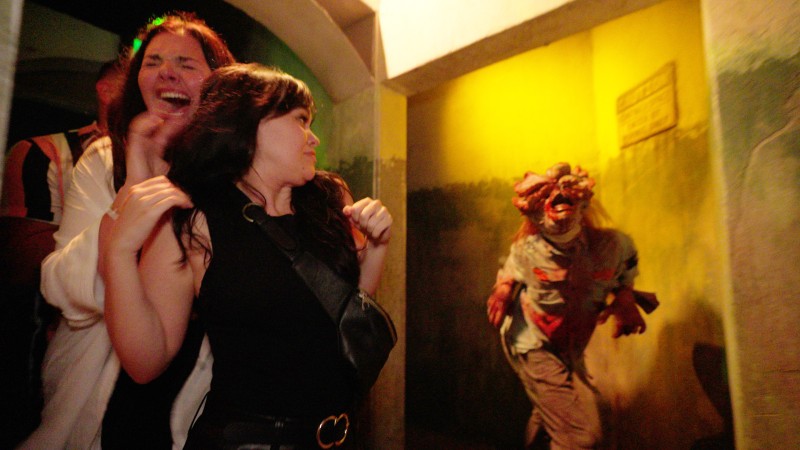It’s the rain-soaked opening of Halloween Horror Nights at Universal Studios in Orlando, Florida, and despite a torrential downpour literally dampening the festivities as gates open to the public, the mood retains an air of excitement, anxiety, and, for some, outright terror. The annual event attracts thousands of horror and theme park enthusiasts starting every September to experience a park that transforms into a twisted, macabre version of itself at dusk all the way up to Halloween.
Actors donning terrifying costumes stalk the now foggy, puddle-ridden streets, lunging randomly at passersby and eliciting plenty of surprised shrieks. There are several elaborate haunted houses based on original IP and popular licenses, serving as the main course for masochistic fans who endure long waits – upwards of two hours. One new house has attracted the largest concentration of fans by far, like curious moths to a shining beacon of horror. It’s not the houses based on Chucky, The Exorcist: Believer, or even the popular fourth season of Stranger Things. It’s The Last of Us, and I’m on my way to experience a recreation of one of my favorite games of all time.
Rewind many hours before, and I’m waiting in Universal’s backlot to take a guided tour through the new Last of Us attraction. It’s around 11:00 a.m., and the sun is oppressively bright and hot with no signs of the storm to come. I’m led to the front of the attraction’s facade: a large, black warehouse with the game’s logo towering alongside protagonists Joel and Ellie – and the giant face of a Clicker for good measure.
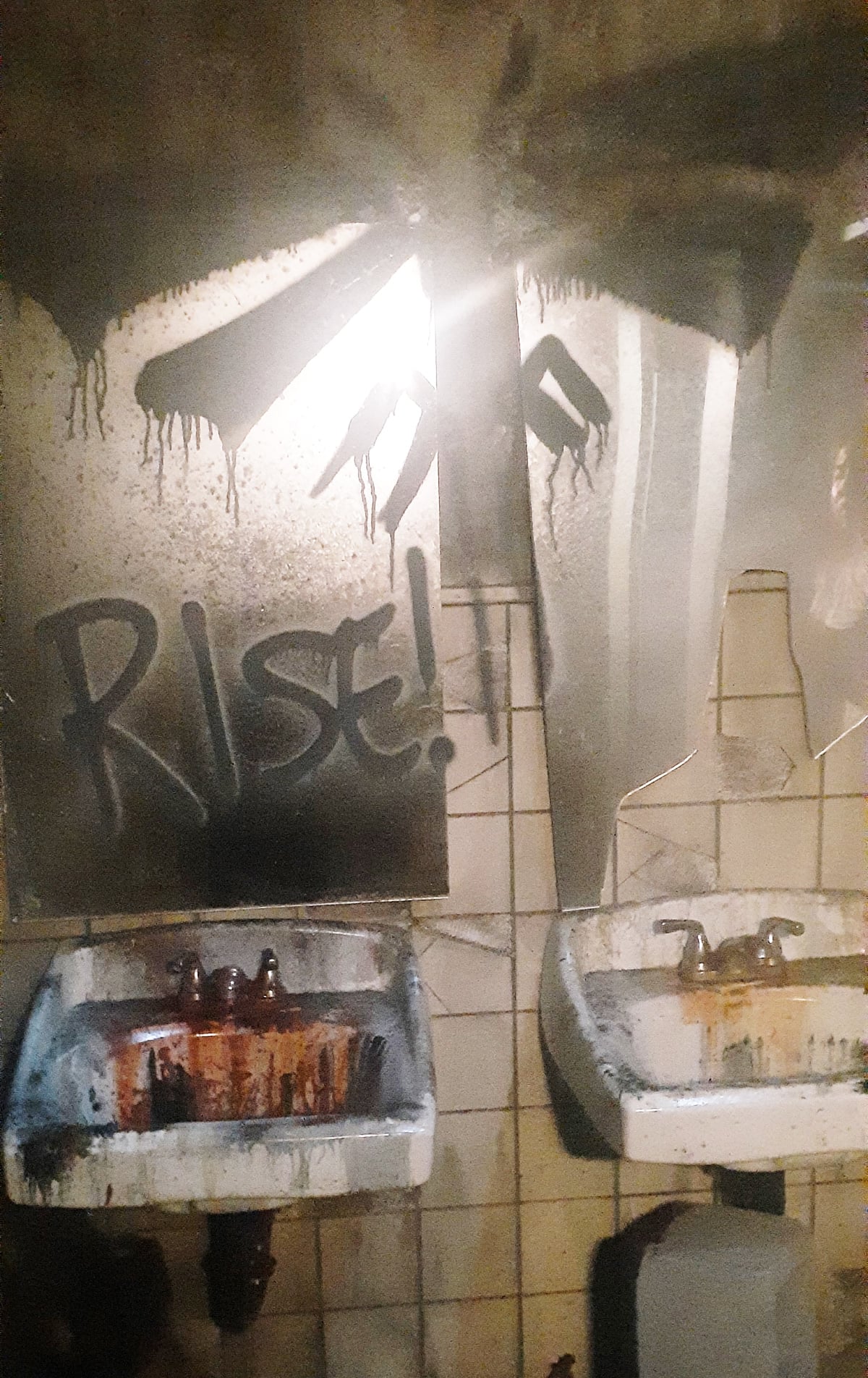
The heavy doors swing open, and out step the two masterminds behind the attraction: Mike Aiello, Universal’s senior director of entertainment creative development, and Neil Druckmann, Naughty Dog president and creative director/writer of The Last of Us.
Speaking with both designers, they told me the seeds for this house were planted around the same time. Druckmann is a massive Halloween Horror Nights fan and tells me he attended his first event while developing The Last of Us. Aiello, who has helped bring HHN to life for two decades, loves the games and immediately saw the potential for an attraction while playing the first entry.
“I remember playing the game…I turned to my wife and go, ‘This would be the most amazing haunted house experience,’” says Aiello. “So even 10 years ago, I was already trying to think about, if ever the chance had happened, how would we create that?”
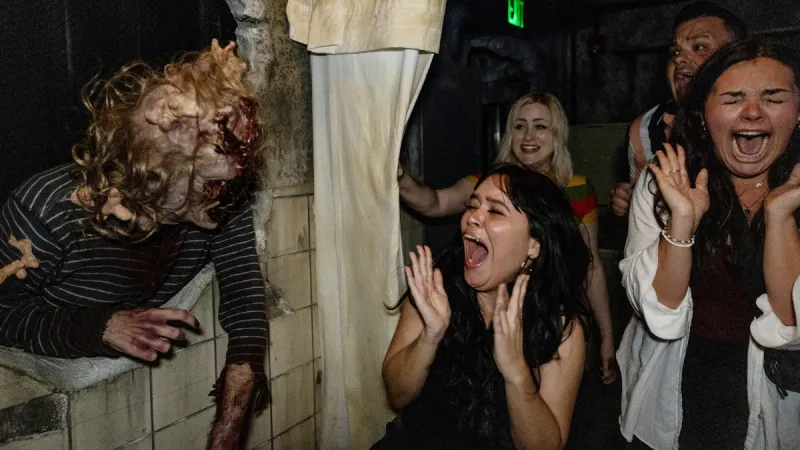
It turned out fans had the same idea. During HHN season a few years ago, Druckmann received messages on Twitter from fans saying how fitting a The Last of Us horror house would be. Druckmann agreed and took a swing by posting a tweet expressing his interest in the hopes of igniting a conversation. It didn’t take long; Aiello messaged him only a few hours later, asking to make it happen.
When choosing an IP to adapt, Aiello says it needs two things: a variety of characters and environments. As a video game, The Last of Us certainly fits, with Aiello calling the franchise “an embarrassment of riches” in terms of elements to pull from. Its large, memorable cast, a slew of creative and recognizable enemies, and multiple destinations across its destroyed U.S. offer plenty of paints for Aiello’s canvas. But the game’s level design has always lent itself well to an amusement park attraction, according to Druckmann. Having studied theme park design in school, he applied those lessons to the game’s wide linear design, pacing out the game’s quieter moments of exploration and tension-building with its jump scares and action sequences.
Halloween Horror Night houses follow a general blueprint. They’re highly detailed, spooky arenas of claustrophobic corridors laden with costumed performers (a.k.a. scare actors) leaping from hiding places to scare attendees. Some performers wait behind curtains, mirrors, or in large cubby holes. Others are placed in plain sight, making you nervously question whether they’re real and how or if they’ll react when you pass by them. Each house features unique thematic or structural twists, but they’re more or less cut from the same cloth.
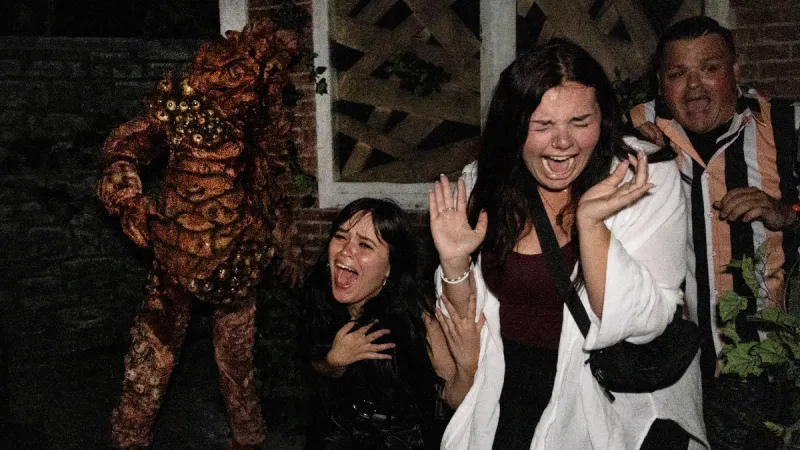
As a franchise that balances horror and action with the tender, quieter moments of its two protagonists, Druckmann believes that helps The Last of Us stand out from the pack.
“I think that you have to have the horror element, you have to have the tension, you have the fear,” says Druckmann. “But beyond that is, again, these core main characters that you’re following and are invested in; that combination, I feel, makes this ride quite unique and special.”
The Last of Us house is based on the first video game (and only the game, so don’t expect any HBO references), with attendees following Joel and Ellie as they make their way through the ruined remains of Pittsburgh. According to Aiello, outside of some initial brainstorming between Naughty Dog and Universal, his team was largely free to develop its own ideas for the house’s story and design, with Naughty Dog only providing reference material and refining certain details along the way. Since he’s such a fan of the event, Druckmann says he didn’t want to micromanage every detail and trusted the experts to do what they do best. It helps that the team responsible has immense reverence for the source material.
“Our show director is Nate Stevenson. He’s probably the biggest Last of Us fan on our creative team,” says Aiello. “The minute we knew we were doing it, he was the first one in line going, ‘Uh, I have to do this. Like, you can’t say no.’”
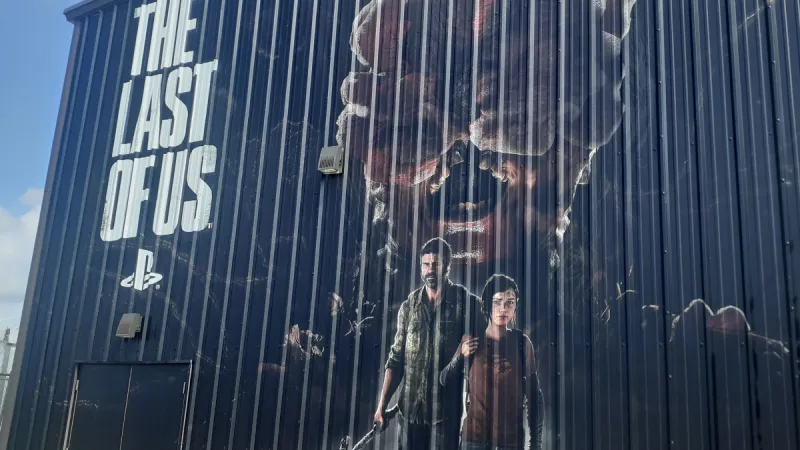
That fandom is immediately evident once I step inside the house. The first room packs plenty of post-apocalyptic detail. Modeled after a ruined city square, shattered concrete abound, and copious signs – all taken straight from the game – decorate the area. My eyes immediately dart to a pick-up truck, once driven by Joel and Ellie, smashed headfirst into a pillar on my right. It’s a real working vehicle that Universal pulverized for authenticity. “We didn’t even ask them to do that,” Druckmann laughs. An actor portraying Joel hides in a nearby corner, pistol ready, ushering us forward while providing cover fire from nearby enemies.
Look-alike actors perform the two heroes during specific moments. While their costumes are convincing, they’re truly brought to life thanks to new dialogue recorded by Joel and Ellie’s original performers, Troy Baker and Ashley Johnson. Being HHN fans themselves, Druckmann says getting them back in the booth was an easy pitch. Universal took first pass on writing their dialogue before Druckmann rewrote their work in the characters’ voices. Along the way, I heard a silhouette of Joel growl, “Spores. Masks up,” as I trekked down a fungus-covered hallway while spore-like flakes rained from above. In one intense moment, Ellie repeatedly screamed, “Die, motherf****r!” as she unloaded rifle rounds right in front of me. Hearing these familiar voices adds to the attraction’s faithful atmosphere.
The sound design was also a treat. Gustavo Santaolalla’s iconic score plays, changing throughout the adventure and swelling to a big crescendo at the end. Entering dark areas and hearing the familiar call of Clickers from seemingly all around me had me on my toes for a surprise jump scare at any angle. When they do appear, the make-up and costumes impressed – especially the much-larger Bloaters. One room had a couple of infected, one mannequin and one live performer, swaying mindlessly until one of them lashed out at me (I won’t spoil which). As creepy as that all sounds, I wouldn’t say the house truly terrified me. Much of that is due to being enamored with the sheer amount of details and Easter eggs hidden through the level.
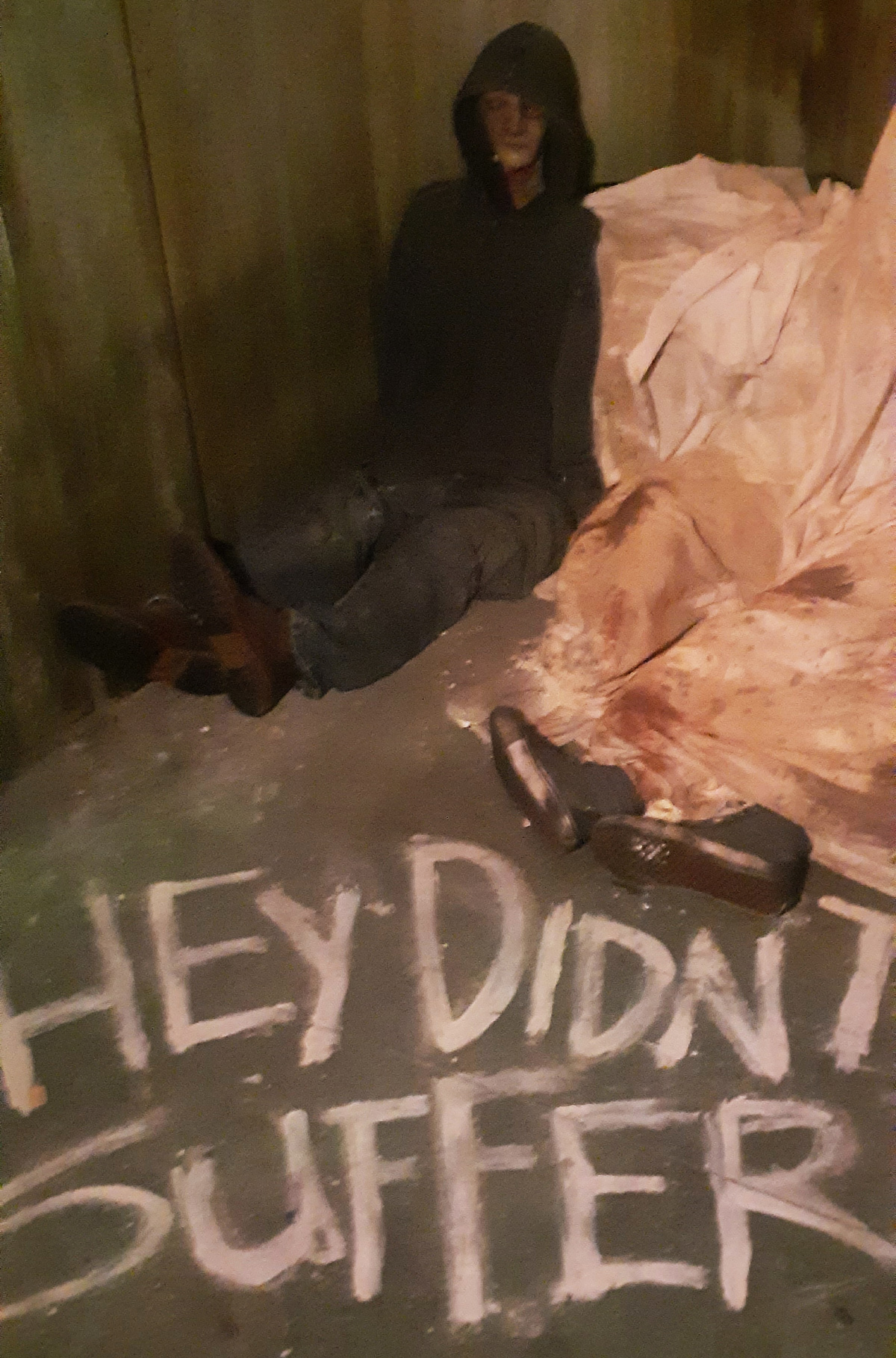
During my journey, I spotted small crawl spaces Ellie would squeeze into, a replica of the workbench, and even recreations of key visual moments from the games. Two standouts include a lore note from Ish, a survivor who once oversaw a thriving sewer community, and the familiar pile of blanketed dead bodies with the, “They didn’t suffer” message painted at their feet. I didn’t find every reference I was told was present, nor would I spoil them here if I did.
It may not have scared my pants off, but The Last of Us house still immersed me in its world, enthralling me on the one hand and effectively reinforcing how awful it would be to live in its universe on the other. Naughty Dog and Universal are very pleased with how it turned out, and hopefully, it will lead to another collaboration (perhaps a house based on Part II) down the line.
“This was the most massive passion project we could have taken on this year,” says Aiello. “We’re really proud of the work the team has done. We’re so proud of working alongside Neil and his team.”
Druckmman sums up his satisfaction more succinctly, “This is better than I could have ever hoped.”
This article originally appeared in Issue 360 of Game Informer.

